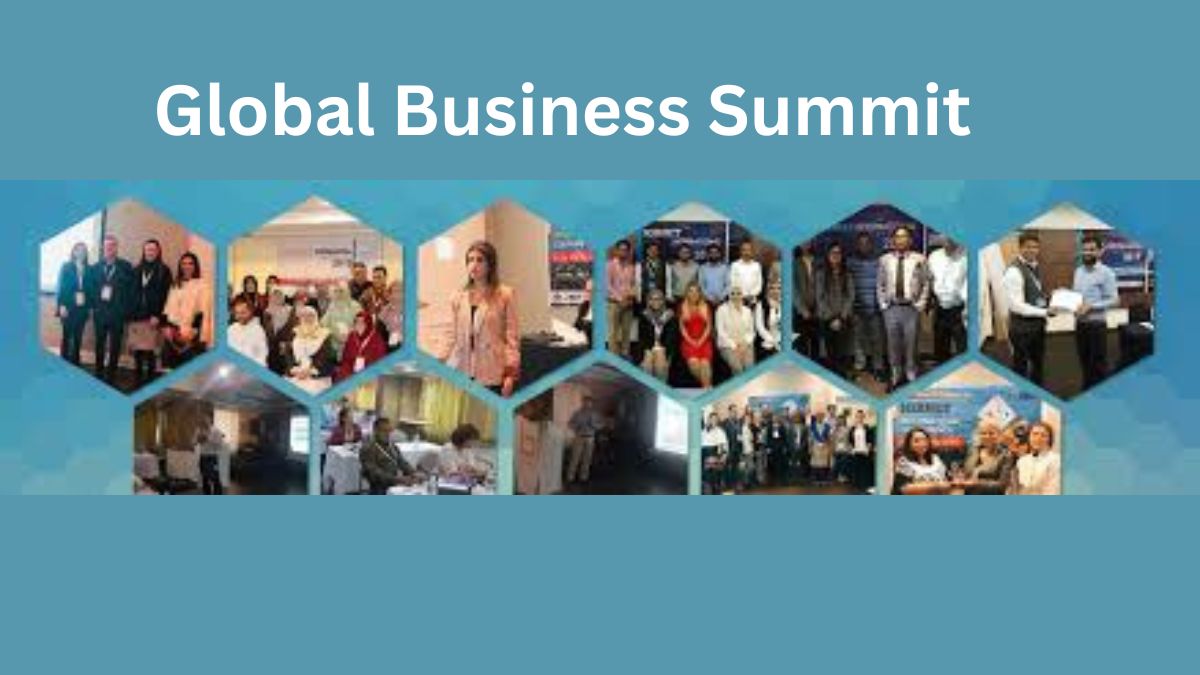BUSINESS
8th Edition of The Global Business Summit: What to Expect and Why It Matters

The Global Business Summit (GBS) is back for its 8th edition, promising to be a gathering like no other. A marquee event in the world of commerce, innovation, and entrepreneurship, this year’s summit is set to align leaders, disrupt industries, and shape the future of global business.
If you’re a business leader, entrepreneur, or policymaker looking to gain strategic insights, expand your network, and stay ahead in the dynamic world of business, the 8th Edition of the Global Business Summit is where you need to be. Let’s explore why this year’s event is crucial, what you can look forward to, and how it continues to drive global economic growth.
What Is the Global Business Summit?
The Global Business Summit is an annual event providing a platform for influential leaders, industry experts, innovators, and policymakers from around the globe to convene. Designed to foster collaboration and inspiration, the summit examines pressing global challenges, opportunities in emerging economies, and groundbreaking innovations shaping the future of industries.
Since its inception, GBS has played a pivotal role in bringing together nations and industries to ideate and execute solutions for a better business world. The event focuses on harnessing the power of technology, data, and sustainable practices to ensure long-term resilience and equity in the global economy.
Why the 8th Edition is Significant
The 8th edition of GBS comes at a critical juncture in global business. With economic recovery post-pandemic, accelerating digital transformation, and urgent calls for sustainability, business leaders face challenges and opportunities like never before.
This year’s summit will be pivotal as it aims to touch upon the Triple Bottom Line: People, Planet, and Profit. The need for leveraging innovation while addressing socio-economic sustainability has never been more urgent. The 8th edition will emphasize actionable strategies and policy shifts required to usher in a new era of business resilience and shared prosperity.
Key Themes and Highlights of the 8th Edition
To give you a better idea of what awaits at the 8th Global Business Summit, here’s a preview of some of the event’s key themes and highlights:
1. Technology as a Business Enabler
One of the core focus areas of this year’s summit is how emerging technologies such as AI, blockchain, quantum computing, and IoT are reshaping industries. Leaders will discuss:
- The future of work and the rise of automation.
- Ethical AI and balancing innovation with responsibility.
- Leveraging blockchain to enhance transparency and efficiency in global trade.
Attendees will get to hear from senior tech executives and engage in panels, showcasing cutting-edge use cases.
2. Sustainability and Climate Innovation
Sustainability continues to remain a key driver of long-term growth and innovation. Speakers at the summit will explore:
- Business solutions to combat climate change.
- Strategies for achieving net-zero emissions in industries.
- Investment in renewable energy and sustainable supply chains.
A dedicated workshop on the “Business of Sustainability” will provide actionable insights on implementing sustainability initiatives effectively.
3. Shaping Global Economic Policies
The summit will feature a special track dedicated to global policy-making in the age of unpredictability. Topics include:
- Economic recovery strategies post-pandemic.
- Fostering global cooperation amid geopolitical uncertainty.
- Policies to support digital trade and inclusive economies.
Expect powerful keynotes from global policymakers and economists who will share insights on creating a thriving economic ecosystem.
4. Empowering Startups and Small Businesses
Recognizing the power of startups in fostering innovation, the summit will include:
- A Startup Hub featuring pitches from promising new ventures.
- Networking opportunities with VCs and multinational leaders.
- A panel on creating startup-friendly ecosystems.
Whether you’re a founder or an investor, this hub will connect you with the next wave of game-changing businesses.
5. Diversity and Inclusion in Leadership
Equity in leadership will take center stage for discussions on:
- Gender equality and bridging the leadership gap.
- Building inclusive workplaces for diverse talent.
- Case studies of companies championing D&I successfully.
High-impact conversations on diversity will offer fresh perspectives for building equitable corporate cultures.
6. Industry-Specific Tracks
From finance and healthcare to agriculture and retail, sector-specific sessions will deliver insights tailored to your field. Leaders and innovators will share industry best practices, challenges, and visions for the future.
Whether you’re in the energy sector or are following developments in fintech, these curated tracks will provide deep dives into industry trends.
Notable Speakers at the GBS 2024
Each edition of GBS brings together visionaries and experts, and the 8th summit raises the bar even higher. From Fortune 500 CEOs to Nobel laureates, this year’s lineup includes:
- [Speaker Name], CEO of [Company Name]: Speaking on the role of AI in shaping the global economy.
- [Speaker Name], Global Climate Advocate: Highlighting business strategies to combat climate change.
- [Speaker Name], Renowned Economist: Offering a bold vision for fostering economic unity amid political polarization.
Attendees will gain unparalleled insights from some of today’s most influential minds.
How to Make the Most of the Global Business Summit
To ensure you walk away with significant value from this experience:
- Prepare in Advance: Research the agenda and identify sessions relevant to your business goals.
- Network Actively: Use the summit’s networking sessions and tools to connect with like-minded professionals.
- Engage Online: Participate virtually using the summit’s digital platform to expand your reach and consumption of the content.
- Take Notes: From panel discussions to keynote speeches, capture actionable insights for implementation.
Why Should You Attend the 8th Edition of GBS?
The Global Business Summit isn’t just another conference—it’s a global movement. By attending, you’ll:
- Gain actionable takeaways to drive innovation and resilience in your organization.
- Collaborate and brainstorm with industry leaders and policymakers.
- Shape the narrative of the future of global business.
Remember, being part of conversations at the cutting edge of transformation doesn’t just benefit your career or company. It helps you contribute meaningfully to the collective progress of industries.
RSVP Today – Join the Change Makers
The 8th Edition of the Global Business Summit is your chance to be at the forefront of the global shift toward innovation, sustainability, and inclusion. Don’t miss this opportunity to shape the future of business.
BUSINESS
.Ydesi: Exploring Its Significance and Applications

The term .Ydesi is steadily gaining attention across industries, yet many remain unclear about its full significance and real-world applications. Whether you’re new to .Ydesi or looking for deeper insights, this blog aims to unravel its importance and showcase its versatility across diverse sectors.
You’ll learn about the origins of .Ydesi, why it matters, and how it’s being applied in practical scenarios. By the end of this article, you’ll have a better understanding of how .Ydesi could revolutionize various workflows.
What is .Ydesi?
.Ydesi isn’t just a buzzword—it’s a cutting-edge system/tool (define .Ydesi more explicitly depending on what it refers to, such as software, a framework, methodology, etc.).
Officially introduced in [relevant year], .Ydesi was designed with the goal of amplifying [specific purpose]. Its adaptable nature allows it to integrate seamlessly into various business, creative, or technological landscapes.
Core Features of .Ydesi:
- Scalability: [Example feature description]
- User-Friendly Design: [Feature description]
- Flexibility Across Platforms: [Feature description]
With these features, .Ydesi is becoming indispensable for those aiming to stay competitive and efficient in their respective industries.
Why .Ydesi Matters
To fully grasp the importance of .Ydesi, you need to understand the issues it addresses. Today’s digital and organizational landscapes are swamped with [describe challenges]. .Ydesi tackles these obstacles with its innovative features that streamline processes and yield tangible results.
Key Benefits of Adopting .Ydesi
- Improved Efficiency: Businesses report up to a [specific percentage] increase in workflow efficiency after implementing .Ydesi.
- Seamless Collaboration: Features [describe like team management tools, shared resource hubs, etc.] facilitate smarter teamwork.
- Cost Savings: By reducing redundancies in [specific processes], .Ydesi helps teams cut operational costs.
- Customizability: Whether you’re an enterprise or an individual, you can tailor .Ydesi to suit your exact needs.
These advantages illustrate how .Ydesi goes beyond being a standard tool—it becomes a central asset in achieving organizational goals.
Practical Applications of .Ydesi
1. Business Operations
Streamlining processes is where .Ydesi shines the most. Companies leverage it to optimize supply chain logistics, reduce administrative bottlenecks, or even bolster decision-making through AI-backed solutions.
Example Use Case
A mid-sized firm using .Ydesi reported cutting approval times for internal processes by 35% within the first quarter of adoption.
2. Creative Industries
.Ydesi supports creative teams by centralizing resources like brand guidelines, design templates, and project timelines.
Example Use Case
Creative agencies cited reduced delivery times for client projects when incorporating .Ydesi-powered frameworks.
3. Education
Whether managing curricula or conducting research, .Ydesi plays a critical role in modern educational institutions by facilitating centralized learning environments.
Example Use Case
[Insert a reference to how a specific university improved scheduling or engagement tracking using .Ydesi].
4. Healthcare
The complexity of managing healthcare operations is often overwhelming, but .Ydesi simplifies patient management systems, billing workflows, and even telemedicine platforms.
Example Use Case
Hospitals leveraging .Ydesi’s customizable tools experienced an 18% increase in operational satisfaction among staff.
5. Freelance Work
Freelancers often manage multiple clients and tasks simultaneously. The organizational tools .Ydesi offers help independent contractors stay on top of deadlines and communications.
Example Use Case
Freelancers using .Ydesi noted improved time management and client satisfaction scores.
Tips for Implementing .Ydesi Effectively
To enjoy the full benefits of .Ydesi, thoughtful implementation is essential. Here’s how you can ensure seamless integration into your workflow.
- Understand Your Needs: Identify why your team or organization needs .Ydesi. From productivity tools to workflow automation, aligning features with your goals ensures success.
- Train Your Team: Conduct training sessions to familiarize your team members with .Ydesi. The more confident they feel using it, the quicker you’ll see results.
- Start Small: Begin with one department or project before scaling up. This allows for troubleshooting and feedback to fine-tune usage patterns.
- Regularly Review Performance: Periodically evaluate how well .Ydesi is meeting your objectives and adjust settings or workflows accordingly.
How to Get Started with .Ydesi
If you’re intrigued by what .Ydesi has to offer, you’re not alone. Many individuals and organizations are already seeing its capabilities take their efforts to the next level.
To begin, visit [insert URL or platform details]. Depending on your needs, you can sign up for a trial or reach out for a consultation that aligns .Ydesi’s potential with your unique requirements.
Bringing It All Together
The significance of .Ydesi extends far beyond its basic functionalities. From empowering businesses to fostering creativity and collaboration, its applications are as diverse as its users. By integrating .Ydesi into your processes, you’re investing in efficiency, innovation, and growth.
Now the only question is—are you ready to explore what .Ydesi can do for you?
BUSINESS
Google My Business: Your Free Tool for Local Success

Google My Business (now part of Google Business Profile) serves as your digital storefront on the world’s most popular search engine. When potential customers search for businesses like yours, your Google My Business listing appears prominently in search results and Google Maps. This means the difference between being discovered by new customers or remaining invisible in the crowded online marketplace.
This guide will walk you through everything you need to know about Google My Business, from setting up your profile to leveraging advanced features that drive real business results. Whether you’re a restaurant owner, retail shop, or service provider, mastering this platform can transform how local customers find and choose your business.
What is Google My Business?
Google My Business is a free platform that allows business owners to manage their online presence across Google Search and Google Maps. When someone searches for your business name or related services in your area, your Google My Business profile displays essential information like your address, phone number, hours of operation, and customer reviews.
The platform serves as a bridge between your business and local customers. Instead of just seeing a basic search result, potential customers can view photos of your products, read recent reviews, check if you’re currently open, and even get directions to your location—all without leaving Google.
For local businesses, Google My Business often provides the first impression customers have of your company. A complete, well-maintained profile signals professionalism and reliability, while an incomplete or outdated listing can drive customers to competitors.
Setting Up Your Google My Business Profile
Creating your Google My Business profile takes just a few minutes, but the impact on your local visibility can be substantial. Start by visiting business.google.com and clicking “Manage now.” You’ll need a Google account to proceed—if you don’t have one, creating it is quick and free.
The setup process begins with entering your business name exactly as it appears on your storefront or official documents. Google takes business name accuracy seriously, so avoid adding extra keywords or promotional language. Next, you’ll select your business category from Google’s predefined list. Choose the category that most closely matches your primary business activity, as this affects when your business appears in relevant searches.
Your business address requires special attention. If customers visit your physical location, enter your complete street address. Service-based businesses that visit customers can choose to hide their address and instead specify their service areas. Phone number and website URL complete the basic information section.
Google requires verification to prevent fake business listings. Most businesses receive verification through a postcard mailed to their business address. This postcard contains a verification code you’ll enter in your Google My Business dashboard. The process typically takes 5-7 business days, though some businesses may qualify for instant verification through phone or email.
Optimizing Your Business Information
A complete Google My Business profile significantly outperforms incomplete ones in local search results. Each section of your profile serves as an opportunity to provide valuable information to potential customers while signaling to Google that your business is active and legitimate.
Your business description should clearly explain what you do and what makes you unique. You have 750 characters to work with, so focus on your primary services, specialties, and key differentiators. Include relevant keywords naturally but prioritize readability over keyword stuffing.
Accurate hours of operation prevent customer frustration and improve your search rankings. Include regular hours for each day of the week, and don’t forget to update them for holidays or special events. Google allows you to add special hours for holidays, temporary closures, or extended hours during busy seasons.
Business attributes help customers understand what to expect before they visit. Depending on your business type, you can specify whether you offer wheelchair accessibility, outdoor seating, Wi-Fi, parking, or accept credit cards. These details help customers make informed decisions and can influence their choice between you and competitors.
Contact information extends beyond your primary phone number. Add additional phone numbers for different departments, and ensure your website URL leads to a relevant page. If you have separate pages for locations or services, link to the most appropriate one for your Google My Business profile.
Managing Photos and Visual Content
Visual content dramatically impacts how potential customers perceive your business. Google My Business profiles with photos receive 42% more requests for driving directions and 35% more clicks through to their websites compared to profiles without photos.
Your profile photo serves as the face of your business in search results and should clearly represent your brand. Use your logo for most business types, or a high-quality photo of your storefront for retail locations. This image appears small in search results, so ensure it remains clear and recognizable when compressed.
Cover photos provide an opportunity to showcase your business environment, products, or services. These larger images appear at the top of your Google My Business profile and should highlight what makes your business appealing. Restaurants might show their dining room or signature dishes, while retail stores could display their product selection or store interior.
Additional photos should tell the story of your business. Include images of your products, services, team members, and interior and exterior views of your location. Regular photo updates signal to Google that your business is active, which can positively impact your search rankings.
Photo quality matters significantly. Use well-lit, high-resolution images that accurately represent your business. Avoid overly filtered or manipulated photos, as customers expect authenticity. Google recommends images be at least 720 pixels wide and 720 pixels tall for optimal display quality.
Leveraging Customer Reviews
Customer reviews serve as social proof and significantly influence purchasing decisions. Research shows that 87% of consumers read online reviews for local businesses, and positive reviews can increase customer likelihood to visit your business.
Encouraging satisfied customers to leave reviews requires a proactive approach. Train your staff to ask happy customers for reviews at natural moments during their experience. Provide simple instructions for leaving reviews, and consider creating handouts or business cards with QR codes that link directly to your review section.
Responding to reviews demonstrates that you value customer feedback and actively engage with your community. Reply to both positive and negative reviews professionally and personally. Thank customers for positive feedback and address any concerns raised in negative reviews constructively.
Review management extends beyond just responding. Monitor your reviews regularly to identify trends in customer feedback. Common complaints might reveal operational issues you can address, while frequently mentioned positives can become talking points in your marketing efforts.
Google prohibits businesses from offering incentives for reviews, but you can make the review process easier for customers. Follow up with recent customers through email or text, providing direct links to your Google My Business review section.
Using Google My Business Features for Growth
Google My Business offers several features that can drive customer engagement and business growth beyond basic profile information. Google Posts allow you to share updates, promotions, events, and news directly on your business profile. These posts appear in your Google My Business listing and can include images, text, and call-to-action buttons.
Posts remain visible for seven days (or until an event date passes), so regular posting keeps your profile fresh and engaging. Use posts to announce new products, share behind-the-scenes content, promote special offers, or highlight community involvement.
The messaging feature enables customers to contact your business directly through your Google My Business profile. When enabled, a “Message” button appears on your profile, allowing customers to send questions or inquiries directly to your business. Quick response times to messages can improve customer satisfaction and potentially influence your local search rankings.
Appointment booking integration allows service-based businesses to accept bookings directly through their Google My Business profile. This feature works with various scheduling platforms and can streamline the booking process for customers while reducing administrative work for your business.
Questions and answers provide another avenue for customer engagement. Customers can ask questions about your business, and you can provide helpful answers. Monitor this section regularly, as unanswered questions might be answered by other users who may not provide accurate information.
Measuring Your Google My Business Performance
Google My Business provides detailed insights about how customers find and interact with your business profile. These analytics help you understand what’s working and identify areas for improvement.
Search queries show the terms customers used to find your business. This information reveals whether customers are finding you through branded searches (searching for your business name) or discovery searches (searching for your products or services). A healthy mix of both indicates strong brand recognition and good category optimization.
Customer actions track what people do after viewing your profile. Metrics include website clicks, requests for directions, and phone calls. Monitoring these actions helps you understand which profile elements drive the most engagement and business value.
Photo views indicate which images generate the most interest. Use this data to inform your visual content strategy, focusing on photo types that receive high engagement.
Regular performance monitoring allows you to identify trends and adjust your Google My Business strategy accordingly. Look for patterns in busy hours, popular search terms, and customer actions to optimize your profile and business operations.
Transform Your Local Presence
Google My Business represents one of the most valuable marketing investments you can make—and it costs nothing but your time. A well-optimized profile serves as your always-open digital storefront, working around the clock to attract local customers and provide essential business information.
Success with Google My Business requires consistency and ongoing attention. Regular updates, photo additions, review responses, and performance monitoring compound over time to improve your local search visibility and customer engagement.
Start by claiming and verifying your Google My Business profile if you haven’t already. Then focus on completing every section with accurate, compelling information. Add high-quality photos that showcase your business, encourage satisfied customers to leave reviews, and respond to all feedback professionally.
Your local customers are searching for businesses like yours right now. Make sure they find you first.
BUSINESS
Why Your Next Paper Bag Should Be Custom and Plastic-Free

With the ever-increasing pace of the global move to sustainability, food industries, cafes, bakeries, and stores are reassessing what effect their packaging will have on the environment and the minds of the clients, respectfully. Nowhere in this ecologically conscious environment has an aspect more emerged as a nice to have that is mandated to be a must have than the use of custom paper bags.
Costing a combination of aesthetics, eco-friendliness, and brand narration, custom paper bags are not only environmentally friendly but also market-savvy, a win-win game between your business and the environment. When your company relies on takeaway package materials, it is time to consider why your future paper bag would be custom and made of plastic.
Wise Material Selection to Wise Businesses
The first step towards sustainability is the materials that you use. Conventional plastic bags are good in terms of being cheap, yet they are notorious in terms of taking a long time to decay, and they are bad for the environment. In comparison, the biodegradable and compostable paper bags, in particular, those manufactured using the recycled material or by a way of the FSC eco-friendly certification method, biodegrade and do not create an immense amount of environmental impact.
Companies, which integrate sustainable takeaway packaging supplies, show their dedication not only to the quality of their products, but to the values that are highly valued by the modern consumers. Change to paper bags without plastic and save landfill waste, minimize regulatory waste risks in using plastic and comply with your operations with a clean future.
Moreover, the printing process is also eco-friendly as the particular inks are water-based or soy-based. The ink does not cause pollution as they are non-toxic and degrade in nature causing minimum pollution and ensuring the high quality of the prints. Selecting materials carefully is not only a step towards good business, but it is an apparent pronouncement of what shoppers do not forget.
Customization Development of Brand Identity
Great packaging is frequently the physical first impression on your brand. A custom paper bag with a good design informs your brand story in a manner that is objectively concrete, pictorial, and effective. You may incorporate logos, color schemes, seasonal motifs, and green messages all that would enhance your brand image.
It can be a simplistic style of design with an expensive patisserie or it can be a bright and strong-colored one with a vivid cafe; custom bags can make an individual see and know your brand. Printing on paper recreates precise graphics and intricate designs that may transform an ordinary bag into a billboard of the brand in question as compared with printing on plastic which produces only blurred graphics and designs.
Moreover, bespoke packaging creates the space to have seasonal sales, partnerships and limited edition of artwork which will allow sharing it on social media. When goods or products with good-looking packaging are shared online by customers, it amounts to natural promotion to improve exposure and reputation.
Waste to Trust: Acquiring the Customer Loyalty
Reflecting on the environment is not the only reason you should be attached to sustainable packaging; instead, it is a sure measure to win the trust of your patrons. In the market where buyers investigate a company’s environmental impact before making the purchase, plastic-free packaging provides the direct confirmation. Your clients will be more apt to patronize you again when they are made to feel that the value is shared between them and the business as opposed to the business being focused on the bottom line.
To add to this trust, you can share your packaging story with your customers, via your web site, your store signage or even on printed messages on your bags. Being transparent creates a relationship, and a simple addition such as making note of the fact that the bag can be used to fit compost waste or with components that have been recycled can add a lot to the impression of your brand by customers.
In a single sentence: The whisky bakery boxes wholesale and other takeaway packaging materials that are customized and plastic-free by retailers are resounding in an environment that promotes sustainability- responsibility.
Your loyal customers also become to-be brand advocates and recommend your products or leave positive comments on the Internet. When their values draw on your packaging, they are better motivated to come out to the support of your product, which acts as free marketing with high possibility of trust.
Combining Marketing and Practicality for Maximum Impact
Marketing of your brand outside stores is one of the benefits of buying custom paper bags that are commonly ignored. Each bag turns into a mobile advertisement that is noticed on the streets, subways as well as in office break rooms. This brand recognition comes without incurring extra advertising costs as this exposure is passive. Whenever your bag design arouses people’s curiosity, they will feel more willing to research about your business or even enter your store the next time they see it.
Concurrently, there is a commonly spread belief that becoming ecologically friendly will be costly, which is no longer the case. Due to the improvement of takeaway packaging, there are numerous custom-printed paper bags that highly match the competitors, particularly on large purchases. The suppliers have come up with the flexible designs reinforced lines like handles, waterproof and even grease-proof linings all of which are both stylish and functional.
More to the point, currently, when cities prohibit the usage of plastic bags or apply some taxes on them, the decision of selecting the paper is the one which protects your brand against the legal or image risks. Brands that smartly package their wares are no longer tolerated but enjoyed by the customers and being able to provide something that is well-designed and long-lasting in its sustainable package can have an effect that is ever-lasting.
Pass Your Brand Onward, and Your Values
Using paper bags, as custom bags instead of using plastic, is not merely a box checking move by your company under sustainability, it is a loud declaration of what you value most as a company. These bags are your morals, your imagination and commitment to good quality and consumer satisfaction.
Paper bags are a notable change that can be impacted with ease in the takeaway supply packaging industry as more businesses pursue materials that meet the current environmental consumer demands. Combined with other environmentally conscious decisions, such as biodegradable cutlery or bakery boxes wholesale made out of recycled board, your packaging will be more of a visual representation of your brand goal.
It is not only a matter of short-term impressions anymore, packaging is a part of a brand experience. The customers today are detail conscious. They circulate them. They verify them. And they do not forget them. A paper bag is customizable and the color, print and design of the bag can make your product feel luxe, nice and environmentally friendly in a single move.
Your packaging is not a last-minute idea. Create benefits out of it. Make it personal. Make it plastic free. And in the process ensure that you make your brand memorable.
-

 NEWS3 months ago
NEWS3 months agoWhat is www.avstarnews.com and What Does It Offer?
-

 TECHNOLOGY7 months ago
TECHNOLOGY7 months agoGomyfinance Invest: Simplify Your Path to Financial Growth
-

 TECHNOLOGY3 months ago
TECHNOLOGY3 months agoAtfboru: A Creative Platform for Designers, Artists, and Entrepreneurs
-

 BUSINESS3 months ago
BUSINESS3 months ago.Ydesi: Exploring Its Significance and Applications
-

 CRYPTO6 months ago
CRYPTO6 months agoCrypto30x.com Gemini: Revolutionize Your Crypto Trading Experience
-

 NEWS1 year ago
NEWS1 year agoDogo News: The Latest Trends in the World of Dogo Argentino
-

 EDUCATION1 year ago
EDUCATION1 year agothe christian between the gospel and society
-

 ENTERTAINMENT1 year ago
ENTERTAINMENT1 year agoWWE SmackDown Episode 1491: Unforgettable Moments That Left Fans Roaring
